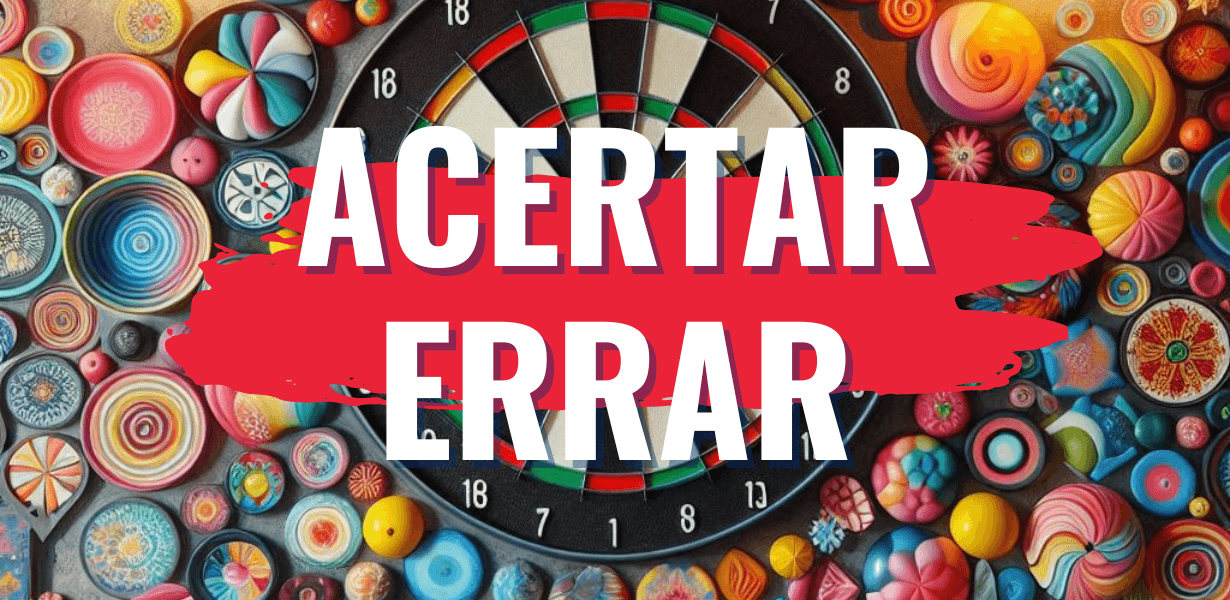Hi there, tudo certinho por aí?
Os verbos acertar e errar têm várias traduções em inglês e hoje vamos trabalhar com algumas delas com exemplos traduzidos e contextualizados. Are you ready? Let’s do this!
ACERTAR
To get something right
- She got all the answers right in the test. (Ela acertou todas as respostas no teste.)
- If you get it right, you’ll win a prize. (Se você acertar, ganhará um prêmio.)
- I finally got the recipe right this time! (Eu finalmente acertei a receita desta vez!)
To hit the mark
- His comments really hit the mark during the meeting. (Os comentários dele foram certeiros na reunião.)
- The ad campaign hit the mark with the target audience. (A campanha publicitária foi certeira com o público-alvo.)
- You always hit the mark when it comes to solving problems. (Você sempre acerta em cheio ao resolver problemas.)
To score
- She scored 90% on the math test. (Ela tirou 90% na prova de matemática.)
- The striker scored two goals in the first half. (O atacante marcou dois gols no primeiro tempo.)
- He scored big with his latest business deal. (Ele se deu muito bem com o último negócio.)
To nail it
- You nailed it with your performance in the play. (Você arrasou na sua performance na peça.)
- She nailed every single question in the interview. (Ela acertou todas as perguntas na entrevista.)
- I think we nailed the presentation to the client! (Acho que mandamos muito bem na apresentação para o cliente!)
To be spot on
- Your prediction about the weather was spot on. (Sua previsão sobre o clima estava perfeita.)
- That description of him is spot on! (Essa descrição dele é exata!)
- Her advice on the project was absolutely spot on. (O conselho dela sobre o projeto foi totalmente certeiro.)
To succeed
- She succeeded in climbing the highest mountain. (Ela conseguiu escalar a montanha mais alta.)
- They succeeded where others had failed. (Eles tiveram sucesso onde outros falharam.)
- With hard work and determination, you’ll succeed. (Com muito trabalho e determinação, você terá sucesso.)

ERRAR
To get something wrong
- I got the last question wrong on the test. (Eu errei a última pergunta da prova.)
- He always gets it wrong when it comes to directions. (Ele sempre erra quando se trata de explicar o caminho.)
- Don’t worry if you get it wrong this time; you’ll improve. (Não se preocupe se errar desta vez; você vai melhorar.)
To miss
- I missed the target by just an inch. (Eu errei o alvo por apenas uma polegada.)
- She missed the chance to apply for the job. (Ela perdeu a chance de se candidatar ao emprego.)
- Don’t miss the meeting tomorrow; it’s important. (Não perca a reunião amanhã; é importante.)
To fail
- He failed to deliver the project on time. (Ele falhou em entregar o projeto no prazo.)
- She failed the driving test twice. (Ela reprovou no teste de direção duas vezes.)
- Don’t be afraid to fail; it’s part of learning. (Não tenha medo de falhar; faz parte do aprendizado.)
To make a mistake
- I made a mistake in the calculations. (Eu cometi um erro nos cálculos.)
- Everyone makes mistakes; it’s human. (Todos cometem erros; é humano.)
- She admitted that she had made a big mistake. (Ela admitiu que tinha cometido um grande erro.)
To mess up
- I messed up the project and had to start over. (Eu estraguei o projeto e tive que começar de novo.)
- Don’t mess up this opportunity; it’s a big deal. (Não estrague essa oportunidade; é algo importante.)
- He messed up his lines during the play. (Ele errou as falas durante a peça.)
To go wrong
- Something went wrong during the experiment. (Algo deu errado durante o experimento.)
- If anything goes wrong, just call me. (Se algo der errado, apenas me ligue.)
- The plan went wrong because we didn’t prepare enough. (O plano deu errado porque não nos preparamos o suficiente.)
To slip up
- He slipped up and revealed the surprise. (Ele cometeu um deslize e revelou a surpresa.)
- I slipped up and forgot to send the email. (Eu cometi um deslize e esqueci de enviar o e-mail.)
- Don’t slip up during the presentation; it’s your chance to shine. (Não erre durante a apresentação; é sua chance de brilhar.)
Veja também:
⇒ Como dizer LOGO NO INÍCIO em Inglês
⇒ CLUE IN | O que significa este phrasal verb
⇒ Como usar THOUGH corretamente em Inglês
⇒ INGLÊS PARA NEGÓCIOS 05 | Diálogo para Praticar + Expressões (Business English)







